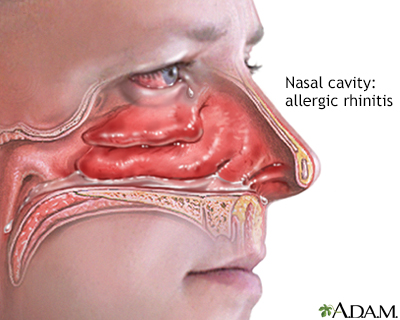Rhinitis

What is Rhinitis?
Rhinitis is inflammation of the mucous membrane of the nose, characterized by a runny nose, sneezing, and nasal congestion. Rhinitis can be allergic (caused by allergens like pollen or dust mites) or non-allergic.
Who’s at Risk for Rhinitis?
Allergic rhinitis can affect anyone but is more common in people with other allergic conditions or a family history of allergies. Non-allergic rhinitis is more common in adults and can be triggered by environmental factors such as smoke, changes in weather, certain foods, and medications.
What Causes Rhinitis?
Allergic rhinitis is caused by an overreaction of the immune system to allergens like pollen, dust mites, or pet dander. Non-allergic rhinitis can be caused by irritants such as smoke and strong odors, or changes in the weather.
How Does Rhinitis Start?
Rhinitis typically starts with exposure to the triggering allergen or irritant. The body responds by releasing histamines, leading to inflammation and symptoms of rhinitis.
What Are the Symptoms of Rhinitis?
Symptoms include a runny nose, sneezing, stuffy nose, and itchy or watery eyes. In allergic rhinitis, symptoms may be seasonal (occurring at certain times of the year, such as spring or fall) or perennial (occurring year-round).
How is Rhinitis Diagnosed?
Diagnosis is based on symptoms, medical history, and a physical examination. Tests may include a skin prick test to identify allergens, a nasal smear to check for certain cells, or a blood test to measure the level of certain antibodies.
How Can Rhinitis Be Treated?
Treatment aims to relieve symptoms and may include antihistamines, decongestants, nasal sprays, and avoidance of triggers. Immunotherapy (allergy shots or tablets) may be an option for allergic rhinitis if symptoms are severe or do not respond to other treatments.
What Complications May Occur with Rhinitis?
Rhinitis can lead to complications like sinusitis, middle ear infections, and nasal polyps. It can also interfere with sleep and daily activities, leading to fatigue and reduced quality of life.
How Can I Prevent Rhinitis?
Prevention strategies include avoiding known allergens or irritants, using a dehumidifier to reduce indoor humidity, and keeping windows closed during high pollen seasons.
Long-term Management of Rhinitis
Long-term management involves regular healthcare visits, adherence to treatment plans, and lifestyle modifications to avoid triggers.
What is Recent Research Saying About Rhinitis?
Recent research is focused on better understanding the causes of rhinitis and developing more effective treatments. Some studies are investigating the role of certain immune cells and the potential of new types of immunotherapy.
Where Can I Go For More Information on Rhinitis?
For more information on rhinitis, visit reputable health websites like the American Academy of Allergy, Asthma & Immunology, the American College of Allergy, Asthma & Immunology, or the National Institute of Allergy and Infectious Diseases.

